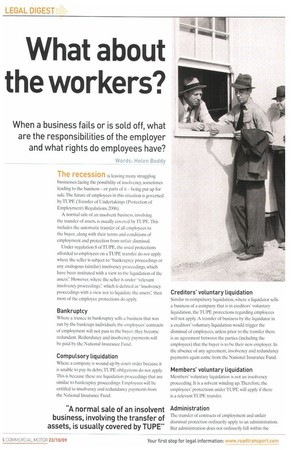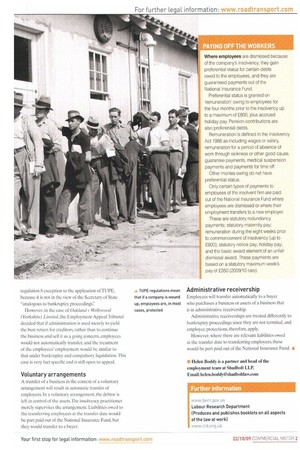What about the workers?
Page 26

Page 27

If you've noticed an error in this article please click here to report it so we can fix it.
When a business fails or is sold off, what are the responsibilities of the employer and what rights do employees have?
Words: Heken Boddy
The recession is leaving many struggling businesses facing the possibility of insolvency sometimes leading to the business — or parts of it — being put up for sale. The future of employees in this situation is governed by TUPE (Transfer of Undertakings (Protection of Employment) Regulations 2006).
A normal sale of an insolvent business, involving the transfer of assets, is usually covered by TUPE. This includes the automatic transfer of all employees to the buyer, along with their terms and conditions of employment and protection from unfair dismissal.
Under regulation 8 of TUPE, the usual protections afforded to employees on a TUPE transfer do not apply where the seller is subject to "bankruptcy proceedings or any analogous (similar) insolvency proceedings, which have been instituted with a view to the liquidation of the assets': However, where the seller is under "relevant insolvency proceedings': which is defined as -insolvency proceedings with a view not to liquidate the assets': then most of the employee protections do apply.
Bankruptcy
Where a trustee in bankruptcy sells a business that was run by the bankrupt individuals, the employees' contracts of employment will not pass to the buyer; they become redundant. Redundancy and insolvency payments will he paid by the National Insurance Fund.
Compulsory liquidation
Where a company is wound up by court order because it is unable to pay its debts, TUPE obligations do not apply. This is because these are liquidation proceedings that are similar to bankruptcy proceedings Employees will be entitled to insolvency and redundancy payments from the National Insurance Fund.
Creditors' voluntary liquidation
Similar to compulsory liquidation, where a liquidator sells a business of a company that is in creditors' voluntary liquidation, the TUPE protections regarding employees will not apply. A transfer of business by the liquidator in a creditors' voluntary liquidation would trigger the dismissal of employees, unless prior to the transfer there is an agreement between the parties (including the employees) that the buyer is to be their new employer. In the absence of any agreement, insolvency and redundancy payments again come from the National Insurance Fund.
Members' voluntary liquidation
Members' voluntary liquidation is not an insolvency proceeding. It is a solvent winding up. Therefore, the employees' protections under TUPE will apply if there is a relevant TUPE transfer.
Administration
The transfer of contracts of employment and unfair dismissal protection ordinarily apply to an administration. But administration does not ordinarily fall within the regulation 8 exception to the application of TUPE, because it is not in the view of the Secretary of State "analogous to bankruptcy proceedings': However, in the case of Oakland v Wellswood (Yorkshire) Limited, the Employment Appeal Tribunal decided that if administration is used merely to yield the best return for creditors, rather than to continue the business and sell it as a going concern, employees would not automatically transfer, and the treatment of the employees' employment would be similar to that under bankruptcy and compulsory liquiclation.This case is very fact specific and is still open to appeal.
Voluntary arrangements
A transfer of a business in the context of a voluntary arrangement will result in automatic transfer of employees. In a voluntary arrangement, the debtor is left in control of the assets.The insolvency practitioner merely supervises the arrangement. Liabilities owed to the transferring employees at the transfer date would be part paid out of the National Insurance Fund, but they would transfer to a buyer.
Administrative receivership
Employees will transfer automatically to a buyer who purchases a business or assets of a business that is in administrative receivership.
Administrative receiverships are treated differently to bankruptcy proceedings since they are not terminal, and employee protections, therefore, apply However, where there are relevant liabilities owed at the transfer date to transferring employees, these would be part paid out of the National Insurance Fund. •
















































































































































